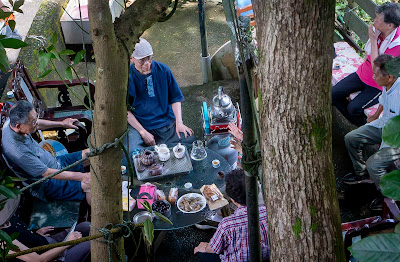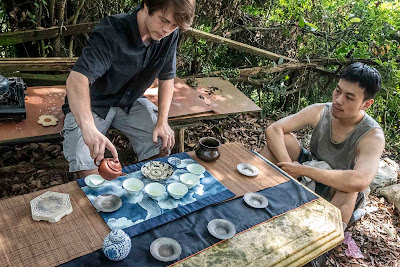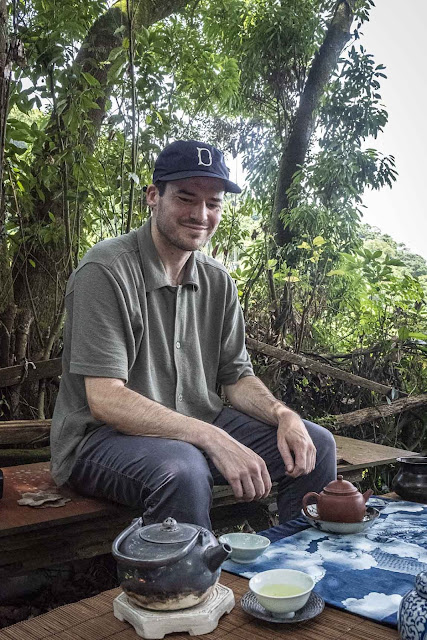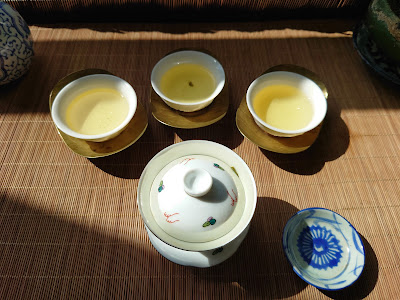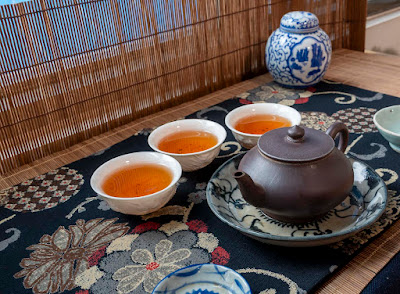There are too many mentions of wine (
125) in the Odyssey for a detailed analysis. So, I will start with explaining some concepts and then I'll analyze some key paragraphs which enlighten the reader about the meaning of wine in this story. It's quite unusual that a beverage should have such an important place in a book. And this book isn't just any book, it's one of the oldest and most important Greek classic. Many scholars see the Iliad and the Odyssey as the fundamental works for the the Western world. I will base some of my analysis on the concepts of René Girard which I explained
here a couple of months ago.
A. Some important concepts
1. The concept of libation
The word 'libation' appears 27 times in the Odyssey. It means 'a drink poured out as an offering to a deity'. In the story, the drink that is offered is always wine. The libation is like a toast to a god at the start or at the end of a feast. The libation establishes a link between wine and the sacred, the gods.
2. The mixing bowl
In this large bowl, the wine is mixed with some water before it's poured in the cups of the guests. In the Iliad, Book IX, verse 202, we read that Achilles asks the mixer to make a strong wine (with little water). So, the water ratio could vary according to the circumstances and the guests. In Book IV, verse 257, we also read that the mixing was an important task, made by the chiefs, and that the normal soldier only received one cup of wine, while the best fighters received as much as they wanted.
Note: in French, the mixing bowl is called 'cratère' in the Iliad instead of 'bol de mélange', mixing bowl!
3. The 'wine dark ocean' color
It's interesting to see that a beverage can also become a color. In this book, 'wine dark ocean' appears 11 times! My interpretation is that during his way back home, by sea, Ulysses sees in the color of the waves one thing that is often on his mind, wine! It's a sign of obsession.
B. The analysis of key mentions of wine.
1. Book I, page 4: "With them (the suitors) were pages and brisk attendants, the pages mixing wine and water in bowls, the attendants washing tables with pory sponges and setting them in place, or dividing out the abundant meat. (...) The carver lifted from his board the tranches filled with all sorts of meat, put them before guest (Pallas Athene) and host (Telemachus), put goblets of gold before them too, and again and again a page came up to pour the wine.
But now in came the overbearing suitors. They began to take their several places on higher and lower seats : pages poured water on their hands, maids heaped up bread in basketfuls, menservants brimmed their bowls with wine, and the suitors stretched out their hands to the dishes there. When they had eaten and drunk their fill, they turned their thoughts elsewhere, to music and to dancing - these pleasures that crown a feast."
Commentary: In the Odyssey, Ulysses makes a difficult journey home. After 10 years of fighting and laying siege to Troy, Ulysses takes another 10 years to go back to Ithaca. He faces a new challenge at home as we can read in this excerpt. His house is filled with suitors who want to marry his wife, Penelope, and become king of Ithaca. These suitors are partying like young students in a fraternity! They drink plenty of wine, eat lots of meat and then dance with music. This rowdy bunch is not spending their parents' money, but the wealth of Ulysses and his family! The wine, the bread and the meat comes from Telemachus' father estate. The rich suitors are ruining him as they court his mother!
On this page, we can see that sharing a cup is part of being host and guest. So, when Athene and Telemachus drink wine, it feels elegant as they are using gold goblets. However, when the suitors drink, the wine seems to make them even less bearable as they loose their inhibitions.
2. Book II, page 19: Telemachus says: "Instead, they (the suitors) haunt my palace day in, day out ; they slaughter my sheep and oxen and fatted goats ; they make merry here, they selfishly drink the glowing wine, and thus abundance of things is wasted."
Commentary: It was suggested in Book I. In Book II, Telemachus dares to criticize the suitors. He becomes more and more manly as the story unfolds.
3. Book II, page 22. "The men made the tackling fast all over the dark rapid ship, then set in place brimming bowls of wine and poured libations to the eternal, unifying gods - above them all to the daughter of Zeus with her gleaming eyes."
Commentary: Sea travel was dangerous. The fate of the sailors depended on the weather. That's why fishermen pray to Matsu in Taiwan and the Greeks would make libations to their gods. In this case, the wine serves to appease the gods. We can notice that the Greeks made a link between wine and anger. For men, an excess of wine can cause anger, but for the gods, wine is supposed to appease them! The link is reversed.
4. Book III, page 32. "when they were all there, the king himself (Nestor), mixed into the bowl a delicious wine, eleven years old, which only now the housekeeper had unstopped and opened."
Commentary: King Nestor mixes the wine for Telemachus, his guest. Like tea brewing, wine mixing is something to important to be left to the servants! Already 2800 years ago, aged wine was recognized as precious (property of the king) and delicious. It's even a new bottle (jar) that is opened in honor of the son of Ulysses. Serving good wine is a sign of respect and the quality and age of the wine should fit the status of the guest.
5. Book IV, page 40. "Then a thought came to Zeus-born Helen: into the bowl that their wine was drawn from, she threw a drug that dispelled all grief and anger and banished remembrance of every trouble. Once it was mingled in the wine-bowl, any man who drank it down would never on that same day let a tear fall down his cheeks, no, not if his father and mother died, or if his brother or his own son were slain with sword before his eyes."
Commentary: After Nestor, Telemachus pays a visit to Menelaus and his wife, the beautiful Helen (yes, the one that Pâris abducted, which started the war of Troy). It's possible that Helen's drug is opium, since it was already mentioned 3400 BC in Mesopotamia and it later passed to Egypt where Helen is supposed to have received this drug from. Or,
6. Book IV, page 49. Menelaus says: "Of all the treasures stored in my house, I will give you the loveliest and richest. I will give you a noble mixing-bowl ; it is silver all-through and rimmed with gold ; Hephaestus made it"
Commentary: Wine is so central in Greek royal society that a mixing-bowl is the first gift king Menelaus gives to king Ulysses' son. We can also tell that it's precious, because it's made of pure silver and is rimmed with gold. It's even made by a god! The silver and gold material remind me of the Tang dynasty tea set recovered from the Famen temple in 1985.
7. Book V, page 57. "And with these words the goddess (Calypso) drew up a table by him, heaping it with ambrosia and mixing the rosy nectar. So Hermes began to eat and drink ; when the meal was over and his spirit refreshed with food, he answered Calypso this"
Commentary: The Greek gods are deathless and have supernatural powers, but they live very much like the Greeks. But the wine is so exquisite that it's called ambrosia, a rosy nectar. Like wine, ambrosia is also first mixed before being served. This quote also shows the custom of eating and drinking first and then talking. After this meal, Hermes asks Calypso to let Ulysses leave her island.
8.Book VI, page 74. Nausicaa speaks to Ulysses: "Near her (note: Nausicaa's mother) chair is my father's chair ; he sits in it while he drinks his wine as a god might do."
Commentary: In the previous quote, we observed that the gods' habits are similar to the humans. The imitation goes both ways! This sentence also suggests that kings are almost god-like. Indeed, royalties are honored and revered in a similar manner to gods. They are kind of sacred and linked to violence, because they lead their armies into wars.
9.Book VII, page 79. "He (note: Ulysses) found the Phaeacian lords and rulers pouring libations from their cup to the Radiant One, keen-sighted Hermes, to whom by custom they poured libation last when they turned their thoughts to the night's rest."
Commentary: This example shows that the libation is like a prayer and that each god serves a different function. Sacrificing wine instead of simply praying with words probably was seen as a better way to get the god's attention. Why? Because wine is so central to Greek life and brings so much joy to the people who drink!
10. Book VII, page 80. Alcinous: "Come now, ask your guest to stand up ; give him a seat on a silver-studded chair, and tell the pages to mix more wine ; then we may make libation to Zeus the Thunderer, the patron of venerable suppliants ; and let the housekeeper offer the guest a meal from such things as she has in store."
Commentary: Here another example of how the Greeks carefully chose to which god they were doing the libation.
11. Book VIII, page 87. "Whenever the sacred bard paused in his song, Odysseus would wipe his tears, draw back the cloak from over his head, take his two-handed goblet and pour a libation to the gods ; but when the bard began once more at the wish of the Phaeacian nobles (for indeed his lay enchanted them), then Odysseus would cover his head again and would groan and weep.
Commentary: Odysseus arrived in the land of the Phaeacians in book VI, but he still hasn't told them his name. During this feast, a bard sings the Iliad war and this causes Odysseus to feel sad and cry, because the dead heroes sung by the bard were his friends. The wine may have taken away his inhibitions and make him cry more easily. This is not becoming for a strong man and he's hiding his pain. Let's also notice that the wine goblet is two-handed. The custom of using both hands to hold the cup is a peaceful gesture, because both hands are exposed and busy. This prevents the drinker from holding a weapon in one hand while drinking.
12. Book IX, page 100. "Then I told the crew we must escape as fast as we could, but in their folly would not listen. Instead there was much drinking of wine and much slaying of sheep and oxen down on the beach".
Commentary: Odysseus tells his the Phaeacians how he journeyed from Iliad to their island. In the Cicones island, his crew sacked a town, but instead of leaving right away, Odysseus' men had a feast. The delayed departure caused a revenge attack by the locals who killed several men from each ship. The excessive wine drinking seems to be the reason for their folly and refusal to leave. Why did they drink too much? Maybe this excess came from the adrenalin rush they must have experienced from the killing and plundering. So, there could be a link between violence and (excessive) wine drinking.

13. Book IX, page 103 "With me I had a goatskin full of dark fragrant wine, given me by Maron (...), he gave me both this and other gifts. They were all noble: seven talents of wrought gold, a mixing-bowl all in silver, and then this wine - he drew twelve jars of it altogether - unmixed and fragrant, a drink for the gods. (...) it was a secret he shared with his wife and with one home-keeper. When they drank this red delicious wine, he would pour just one cupful of it into twenty measures of spring water ; from the mixing bowl there would be a fragrance beyond all words, and no one could find it in his hear to refrain. Of this wine I now carried a great goatskin with me"
Commentary: this excellent wine's quality is going to help Odysseus deal with the cyclops who has imprisoned him and his men, as we can read in the next mention.
14. Book IX, page 107 "And at that I came close to the Cyclops and spoke to him, while in my hands I held up an ivy-bowl brimmed with dark wine: 'Cyclops, look! You have had your fill of man's flesh. Now drain this bowl and judge what wine our ship had in it. I was bringing it for yourself as libation, hoping you would take pity on me and would help to send me home'. (...) He took my present and drank it off and was mightily pleased with wine so fragrant. Then he asked for a second bowlful of it: 'Give me more in your courtesy, and tell me your name here and now - I wish to offer you as my guest a special favor that will delight you. Earth is bounteous, and for my people too it brings forth grapes that thrive on the rain of Zeus and that make good wine, but this is distilled from nectar and ambrosia.'
So he spoke, and again I offered the glowing wine ; three times I walked up to him with it ; three times he witlessly drank it off. When the wine had coiled its way round his understanding, I spoke to him: '(...)My name is Noman."
Commentary: Thanks to this delicious wine, the Cyclops becomes more friendly with Odysseus. He is mesmerized by its quality and thinks it's ambrosia, the nectar of the gods. The wine probably helped to make the Cyclops even more witless and get drunk. The wine has also caused the Cyclops to fall asleep and Odysseus and his men use this opportunity to drive a stake of wood through his unique eye and blind the Cyclops. This is the second time in a row that wine brings harm to those who drink it in excess.
15. Book X, page 118. "The goddess (Circe) ushered them in, gave them all seats, high or low, and blended for them a dish of cheese and of barley-meal, of yellow honey and Pramnian wine, all together ; but with these good things she mingled pernicious drugs as well, to make them forget their own country utterly."
Commentary: Circe used wine and a drug to subdue Odysseus' men and then turn them into swines. Wine is described as 'a good thing' and it's the drug that creates the amnesia. However, the men's strong desire for wine may also explain why they dropped their guard and ingested the dangerous substance. Odysseus will be more careful and won't eat and drink what Circe serves him. This Circe story is very modern as we have all heard of women drugged in bars with pills diluted in their alcoholic beverages.
16.Book X, page 127 and book XI, page 129. "There was one of them called Elpenor, the youngest of all, neither brave in battle, nor firm in mind ; he had left the rest of my company and had lain down on the top of Circe's house, heavy with wine and seeking the cool. (...) he fell headlong from the roof ; his neck was wrenched away from the spine, and his soul went down to the house of Hades."
(...) ""Son of Laertes, subtle Odysseus, I (Elpenor) was led astray by the cruel sentence of some divinity and the excess of wine."
Commentary: The first ghost Odysseus meets in the house of Hades (where the deads' souls go) is Elpenor who just died as he fell from Circe's roof. Elpenor says that his death was caused by the whim of a god and by his excess of wine. Indeed, this young lad wasn't firm in mind. This probably means that his mind couldn't handle the wine well, that he often drank one cup too many. Like many drunks, Elpenor doesn't take full responsibility and blames the gods. Again, gods and wine and death (violence) are connected in this story. This gives me now enough evidence to introduce René Girard's theory about violence and the sacred. For this anthropologist, sacrifices (like libations) are ways to reproduce a symbolic violence that replaces real violence. So, since wine caused lots of drunken men to fight or to do dangerous things (like climbing on roofs), wine had to become a sacred beverage. And to make it less dangerous, it made sense to mix it with water, so that the people would stop being thirsty before they became drunk. The libations also serve to limit the use of wine to formal, sacred occasions.

17. Book XII, page 151. "They had no wine to make libation over the burning sacrifice, but instead poured water as they set roasting the inward parts."
Commentary: Odysseus' crew has decided, against his will and against the warning of the gods to slaughter and eat the Sun god's cattle. To add insult to injury, they perform their libation with water instead of wine. No wonder they will soon all perish in a tempest between Charybdis and Scylla!
18. Book XIII, page 155. "'Pontonous, mix wine in the bowl and serve it to everyone in the hall, so that first we may pray to Father Zeus and then send forth our guest on his way to his own country.'
And at the command the page began mixing the fragrant wine, the stood by them all in turn to pour it ; and they in their places made libation to the blessed gods whose home is wide heaven itself."
Commentary: After listening to Odysseus' story, king Alcinous agrees to help him go back to Ithaca. In this quote, we see an example of how wine is drunk in a very orderly manner. The king decides a libation to Zeus, the gods and everybody follows his order. It's also worth noting that Homer never mentions Dionysos, the god of wine, dance and chaos despite all the mentions of 'wine' in the book. Homer, on the other hand, often speaks of Apollo, the god of music, poetry and order. This shows that Homer favors the values Apollo.
19. Book XIV, page 176. Odysseus says: "I am about to make a wish. It is wine that prompts me, wine that crazes a man's wits and urges even the sage to burst into song and feeble laughter and tempts him to dance and to utter words best left unspoken."
Commentary: Odysseus acknowledges that wine makes you say and do foolish things. It's noteworthy that he's not blaming it on any god, but directly and justifiably points to the alcohol. This is clearly a criticism of wine. It shows that you lose your rationality when you drink. The fact that these words are spoken by Odysseus carry special weight, because he's always 'shrewd' and 'subtly speaking'. He was careful not to carried away by the wine he drank during his journey.
20. Book XV, page 184. "It was the son of this Polypheides - Theoclymenys was his name - who came up to Telemachus and found him by his swift dark vessel praying and offering libation. (...) Friend, since I find you offering sacrifice in this place, I implore you by that sacrifice and by the god you are worshipping"
Commentary: Telemachus is about to return to Ithaca and he heard that the suitors want to kill him. That's why we find him praying and offering libations. The religious character of the libation is underlined by the prayers and by the fact that Theoclymenys describes the libation as a sacrifice.
21 Book XVI, page 193. Odysseus says "Or if I, one man, must fall by the hands of that mass of men, why then, I would rather perish, rather meet death in my own palace, than look on perpetually at things as detestable as these - guests being set upon, serving-maids dragged in shame down the noble halls, wine drawn to waste, food devoured in folly and recklessness, all for a purpose that never shall be achieved."
Commentary: Odysseus is filled by rage and attempts to convince Telemachus, who doesn't yet know that father is talking to him, to take revenge on the suitors. 'Wine drawn to waste' is one of the reasons for their anger. Again, there's a link between wine and anger, which leads to violence. But here it's not the alcohol in the wine that makes them violent, but the waste of a precious and even sacred beverage. Indeed, wine has become sacred, so that it would be drunk reasonably, in small amounts. These suitors are guilty of drinking too much !
22. Book XVII, page 214. Penelope tells Odysseus, disguised as beggar "they slaughter our sheep and oxen and fatted goats ; they make merry here, they selfishly drink the glowing wine and thus abundance is wasted."
Commentary: Penelope is angry at the suitors for the same reasons as her son and as Odysseus. She describes the suitors as 'selfish'. It's also a question of a conflict between the obligation a host has to his guest and the principle of private property. A host is supposed to offer a free meal to all the people who come along, even to Odysseus dressed as a beggar. However, a guest isn't supposed to come back every day for several years, like the suitors, never bring gifts, but eat and drink what belongs to the host.
23. Book XVIII, page 227. Odysseus, the beggar, insults Eurymachus who answers: "Wretch, I will make you suffer for this (...) Either the wine has befuddled you or your mind is already set that way. (...)
So Mulius of Dulichium, the noble attendant of Amphitonomus, mixed wine for them all, then stood by them each in turn and poured the draught. They made libation to the Blessed Ones, then drank the delicious wine. Having made libation and drunk to their heart's content, they went their way back to rest, each in his own house."
Commentary: Eurymachus, the main suitor, wonders if the beggar (Odysseus) insults him, because he had too much wine and can't control what he says. This is an example of wine use that almost led to violence. Luckily, Prince Telemachus found a solution to diffuse the tension: he proposes a libation to the gods and that everybody go back to his own home to sleep. This is a perfect reversal of the role of wine. At first, tt almost triggered violence, then it became the tool to bring back harmony in the palace, between the suitors and the beggar. How? Through a libation, through a religious way of using wine. These two pages exactly describe the link of violence and the sacred, just as René Girard explained.
24. Book XX, page 249. "Telemachus, for his own purposes, gave Odysseus a seat in the hall close to the stone threshold, setting down a humble stool and a meagre table there. He put beside him a portion of the inwards and poured him wine in a golden cup, saying to him: 'Now sit there, and drink your wine with this company. I myself will give you protection from the taunts and violence of the suitors, because the wealth of this house is not any and every man's: Odysseus won it, and I am his heir. And as for you, suitors, control your passions. No gives, no blows, or there may be bad blood and contention here.'"
Commentary: Telemachus has grown more confident. His words are defiant towards the suitors. The tension is building, vengeance is approaching and both Odysseus and the suitors are drinking wine...
25. Book XXI, page 260. "They (the suitors) were all enraged, because they feared he might string the bow, Antinous turned on him and reviled him: "Miserable stranger, you are out of your wits. Are you not content to dine at ease in our lofty company, never grudged your share in the feast, able to hear all the words that pass between us? No other stranger, no other beggar listens to us discoursing. Wine is crazing you, fragrant wine. Wine is many a man's undoing, when he gulps his draught and will never drink discreetly. Wine it was that darkened the wits of Eurytion the centaur in the palace of bold Peirithous. The centaur had come to the Lapith's country, and now with wine he clouded his understanding and in his frenzy did monstrous things in the very hall of Peirithous."
Commentary: Odysseus has asked to participate in the contest of the bow. It consists of putting a string on Odysseus' bow and then shoot through axes with it. The suitors all failed to even string the bow! They must be quite drunk themselves to fear that an old beggar could complete what their young muscles were unable to perform. They are angry and Antinous makes an reverse accusation on the beggar by telling him that the wine is crazing him and will be his undoing. He's about to find out how right and prophetic his words are concerning his own fate!
26. Book XXII, page 265. Odysseus: "'I mean to find out if I can strike it and if Apollo will grant me glory.'
So he spoke, and aimed the keen arrow at Antonious. The youth had almost raised to his lips a fine two-handled golden goblet, indeed he had it between his hand, ready to taste the wine. No fear of slaughter was in his heart. Who, with his friends feasting around him, would think that one man among so many, let his prowess be what it might, would bring grim death and black doom upon him?"
Commentary: As Odysseus starts his revenge killings, he invokes Apollo, the god of order and rationality. His goal is to restore himself to the position of king of Ithaca and husband of Penelope. This confirms (see #18) that Homer is much prefers civilized Apollo to barbaric Dionysos. The fact that Odysseus strikes at the unarmed Antonious (who holds the golden goblet with both hands) seems unbecoming of a civilized hero. This is explained by the fact that Odysseus faces so many foes in the same hall. He only has his son, a swineherd and a cowherd against all the suitors. Odysseus was be moved by vengeance, but he waited for the best moment to strike his enemies in order to maximize his chances of success.

This concludes my commentaries of the Odyssey concerning wine. These 26 quotes have shed a lot of light on the links between wine, the violence it produces, the Greek gods and how libations, the sacrifice of wine can help bring harmony among the drinkers. This is textbook example of what René Girard has described in 'Violence and the Sacred'. This article is too long already, so I will write what all this can mean for tea in another post!
Note: the blog's 20 years anniversary is coming soon. In order to thank all of you who have supported my work with your tea purchases, I have created a promotion of -20% on 20 teas and 20 accessories for 20 days (until the end of June)! Order soon while there's enough inventory!






